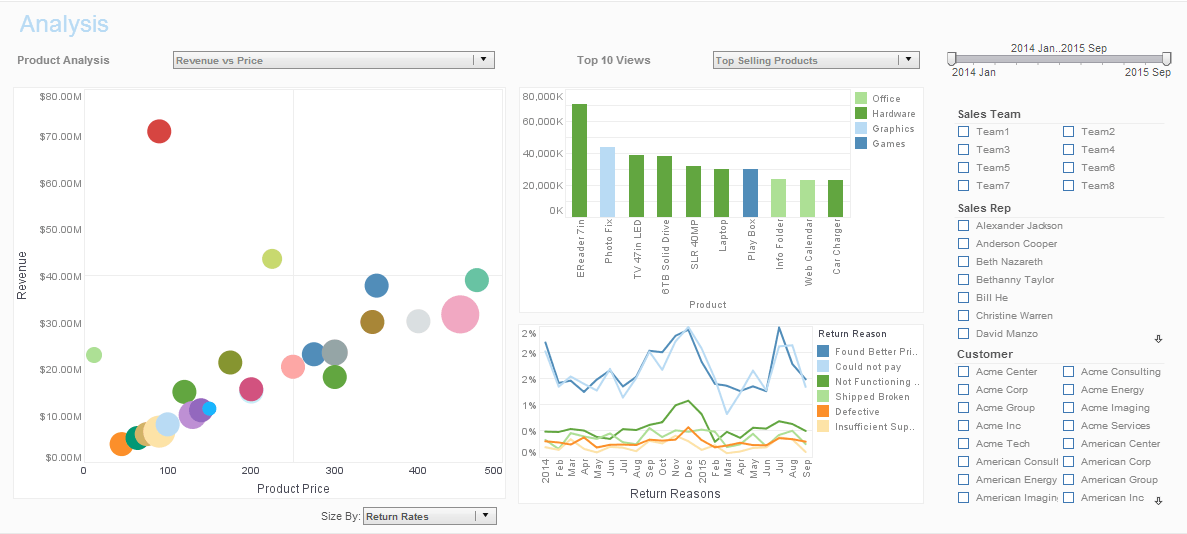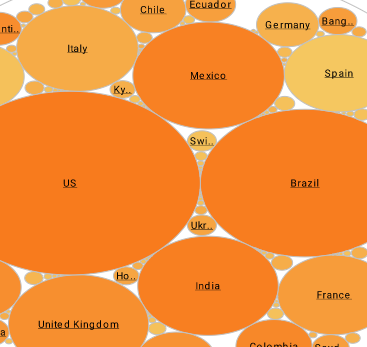Ineffective Customer Satisfaction Measuring Methods
This is the continuation of the transcript on "Top Ten Business Intelligence Mistakes” hosted by InetSoft. The speaker is Christopher Wren, Principal Consultant at TFI Consulting.
Number seven, I am still seeing a lot of ridiculously ineffective customer measures. You look at the whole customer section and most scorecards and how do you think most organizations measure customer satisfaction surveys? What’s wrong with the survey? It’s old. What else do you have besides the customers you already have? Do most of you fill out all the surveys you get? I don’t, and I get surveyed to death. I get surveyed by my dentist, by the guy who fixes my car, my gardener, and sometimes I get a dollar in the mail. Have you ever received a dollar in the mail with the survey trying to make you feel guilty? I keep the dollar and feel guilty for about five seconds and throw the survey in the trash.
I find that two types of people fill out surveys: mad ones who hate you and bored ones, who don’t have enough work to do. I kill an hour filling out these surveys. So I am not a big fan of customer surveys. The latest and real dangerous trend, I think, is not to ask 10 questions or 15 questions but to ask just one question on willingness to recommend on a 1 to 10 scale.
| #1 Ranking: Read how InetSoft was rated #1 for user adoption in G2's user survey-based index | Read More |
Did you guys hear about the big cover story in Business Week about some guy from GE saying this is going to be bigger in six sigma? Do you think a one question survey would differ if the check engine light on your car came on this week three times versus you getting the survey last week and the check engine light never came up? It would make a big difference wouldn’t it?
Do you think you could have a vendor you’ve been doing business with that you give a 10 on willingness to recommend and then they screwed up something really bad this week and all of a sudden, they are out the door? It could happen.
So I found a better way to measure this than the customer surveys a lot of my customers have been using. I call it the customer rage index. Basically what it measures is how much did we make our customers angry while they were trying to give us money and buy our stuff.
So the first company I ever saw that came up with this was FedEx. FedEx used to do surveys and found that there was no correlation between the survey data and customer loyalty. People always say I love FedEx, I love FedEx, and then they switch to DHL. What happened? I have no idea but everyday now they measure how many things that they messed up on that they know impacted customers happiness with them and multiply the number of mistakes by the severity of the mistake. Afterwards they weigh them from a scale of 1 to 10.
So what do you think would be a minor mistake for FedEx? It’s slightly late that you get your package at four o’clock when it was supposed to arrive at three o’clock. So you are a little bit aggravated but you are not ready to cancel your account with FedEx. What do you think a 10 would be? They never find your package. It was on a plane with Tom Hanks in “Cast Away” and it just never showed up. They say we’ve looked and looked but never recovered your package. Wouldn’t that make you hate FedEx?
A nine would be when you get the package but it was three weeks late while having the package be run over by four trucks with tire marks all over. So, FedEx could count how many of these mistakes they have on a daily basis and they use that to predict customer loyalty.
I applied this method to the electric and gas company. What can electric and gas companies do to make you angry? How about dropping your service? Most of the time, they aren’t allowed to do that because we have to use their service. How about doubling your rates in the last year? Does this aggravate you guys? It aggravates me. I look back last year and see that I paid $76 but now pay $176. How about you go on vacation and you find out your electricity has been out for a whole week? Your freezer and your hardwood floors are ruined.
Your electric power company apologizes by saying we’ve been putting your checks in the wrong account for the last three months. You hate them now that you’re pretty aggravated, aren’t you? You’re going out and buying generators at Home Depot now. What about you come home tonight and you find every clock in your house blinking, is that aggravating? It is to me because I’m technologically challenged and I have a hard time setting a clock on the microwave and other things but it’s not as bad as your hardwood floors being ruined.
So how about a software company? What could they do to make you angry? Probably a lot of things. You tried calling some of these other companies that aren’t inspired and 100% fully helpful. The phone rings 92 times and you get somebody who you know is not here in this country answering the telephone. You know you’re going to have problems communicating with this person. You have to repeat everything you say and they have to repeat everything they say. Wouldn’t you be annoyed? You bet. In fact, I read some research recently that said people’s aggravation goes up by about three points as soon as they hear a foreign accent on the customer service line because they already know that they may have trouble with these guys.
 |
Read the top 10 reasons for selecting InetSoft as your BI partner. |
He may say his name is Tom but I think otherwise. So there are ways that every industry can measure the amount of aggravation that they cause their customers on a daily basis. I think that’s much better than these customer satisfaction surveys.
If you’re doing a survey, I wouldn’t tell you to stop doing it, especially if you are getting a good response rate. Airlines get pretty good responses on their surveys because we got nothing to do on the plane. So, they give you a pencil and give you something to do while sitting. Most companies though, don’t get a real good return.
So keep doing it if you’re doing it, but I wouldn’t rely on that as your only measure and I certainly wouldn’t rely on a one question survey as your only measure of customer satisfaction. It’s very unlikely that would provide a true view of what’s going on with your customers.
| Previous: Learn to Rely on Data, Not Strategy Maps |
Next: Worthless HR Metrics
|



